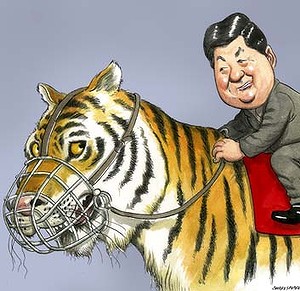China is now Cambodia’s largest foreign
investor, a major donor of aid and an increasingly important trading partner.
But this growing relationship is also accompanied by renewed controversies
China undeniably plays a crucial role in Cambodia’s economic
development. China invested a total of US$9.17 billion between 1994 and 2012.
Chinese investment in the textiles industry has increased Cambodia’s exports
and created employment for thousands of women in rural areas, while investment
in the energy sector, particularly in hydropower development, has helped reduce
Cambodia’s chronic energy shortages. China is also a major source of foreign
assistance for Cambodia. By 2012, Chinese loans and grants to Cambodia reached
US$2.7 billion, making it the country’s second-largest donor after Japan.
Cambodia has been using China’s so-called ‘no strings attached’ aid to build
roads and bridges, helping to improve the country’s much needed infrastructure.
But behind these impressive numbers lie hidden agendas and
serious social and political implications. While Chinese investment and aid is
much needed for economic development, China’s unquestioning approach to how its
aid and investment money is distributed and used has exacerbated corruption,
deteriorated good governance and human rights, and ruined Cambodia’s resources
and natural environment. Human rights activists have often accused Chinese
textile factories of abusing worker’s rights, while China’s hydropower
investments have destroyed protected areas, forest biodiversity and wildlife
habitat.
In return for its generous financial aid, China has exerted
its influence on Cambodia to propel its own political interests. Cambodia’s
decision to deport 20 ethnic Uyghur asylum seekers to China upon Beijing’s
request in 2009 is a clear example of this. In another instance, after
receiving millions of dollar in pledges from China last year, Cambodia
refrained from discussing the South China Sea disputes during the ASEAN Summit,
which was harshly criticised by the international community and resulted in the
failure by ASEAN’s foreign ministers to issue a joint communiqué for the first
time in ASEAN history. Cambodia has also been accused of favouring Chinese
investment, putting China’s investment interests above that of other nations.
According to a report by the Cambodian Center for Human Rights, 50 per cent of
the land concessions granted since 1994 — totalling 4.6 million hectares — were
given to Chinese companies to invest in mining, hydropower and agriculture in
Cambodia.
There are concerns that the government is at risk of losing
its autonomy. If it were to rely solely on China, Cambodia also risks losing
face and trust from the international community, and its role in ASEAN might be
marginalised if it continues to put China ahead of ASEAN.
There is no doubt that Cambodia needs China’s assistance to
further its economic development. Likewise, China sees Cambodia as an important
ally for exercising greater influence in Southeast Asia and counterbalancing
the United States. Chinese Ambassador to Cambodia Pan Guangxue recently said
that the positive relationship China and Cambodia have built over the years
serves as a role model of friendship between countries of different social
systems. He is convinced that, with the careful guidance of its leaders and the
efforts of its people, China and Cambodia can further deepen their mutual trust
for one another and improve cooperation, so as to develop the relationship to a
greater level.
To ensure this long-lasting relationship is mutually
beneficial, the two nations must work together to improve transparency, promote
participatory and inclusive development by involving all relevant stakeholders,
and minimise environmental degradation. Cambodia must strengthen its
institutions, implement policies that encourage responsible investment and link
aid to poverty reduction. China needs to rebuild its image as a good neighbour
and international citizen — one that is accountable for its foreign investment
and promotes sustainable development.
Heng Pheakdey is Founding Director of Enrich Institute
for Sustainable Development.

No comments:
Post a Comment